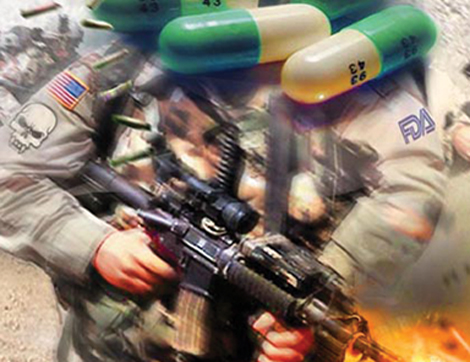
By Keith Johnson
Perpetual warfare has taken its toll on the young American service men and women the U.S. enlists to maintain its global empire. According to figures recently disclosed by the U.S. Army surgeon general to The Los Angeles Times, “more than 110,000 active-duty Army troops last year were taking prescribed antidepressants, narcotics, sedatives, antipsychotics and anti-anxiety drugs. Nearly 8% of the active duty Army is now on sedatives and more than 6% is on antidepressants—an eightfold increase.”
This AFP writer recently spoke with Bruce E. Levine Ph.D., a psychologist and author of Surviving America’s Depression Epidemic.


When the doctor was asked what has contributed to this alarming statistic, Levine said, “It’s the multiple deployments. If they are in such bad shape that they need medication, they certainly shouldn’t be sent into a combat zone.”
Most of the drugs being prescribed to these soldiers fall under the category of psychotropic medication. “Antidepressants affect dopamine levels in the brain, seratonin, and norepinephrine,” said Levine. “These are the same kind of neurotransmitters that cocaine affects. So if you take multiple antidepressants, which some of them do, you’re likely going to induce the same reactions as people who are on a lot of street drugs.”
Levine went on to say, “If you’re stressed out and traumatized enough to need these medications, you certainly should be in counseling. Of course, that’s not happening in the battle zone. So basically, what these guys are doing is taking these medications to take the edge off. They’re using these drugs the same way soldiers in Vietnam used marijuana and heroin. They’re self-medicating with psychiatric drugs that now have the official sanction of military approval.”



When asked what motivates the U.S. military to maintain this philosophy in spite of the overwhelming data that exposes the inherent danger of these drugs, Levine leveled part of the blame on the powerful pharmaceutical industry. “There’s a huge lobbying effort in Washington D.C.,” said Levine. “Pharmaceutical companies have enormous power in terms of influence on every level of the whole mental health treatment. Even in civilian life, they contribute massive amounts of money to organizations like the American Psychiatric Association and the National Alliance on Mental Illness. Any of these antidepressant drugs are worth $3 or $4 billion per year. So, it’s no big deal for them to spend $20 million a year to convince whatever institution that their drugs are safe and effective.”
Levine was then asked if the benefits of these drugs outweigh the obvious dangers?
“Absolutely not,” replied Levine. “There is a psychologist named Irving Kirsch who was recently featured in a 60 Minutes segment. He studied these antidepressants and determined that there is basically no difference between them and a placebo in terms of actually helping alleviate depression. So overall, these drugs are pretty dangerous and unsafe for a certain percentage of people by creating a lot of disinhibiting effects—which means it makes some people more likely to become self-destructive, or destructive to other people.”
As far as Levine is concerned, there is only one reasonable solution to this epidemic: “The best treatment for these guys is to get them the hell out of these places that they really don’t need to be in.”
——
Keith Johnson is an independent journalist and the editor of “Revolt of the Plebs,” an alternative news website.

